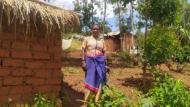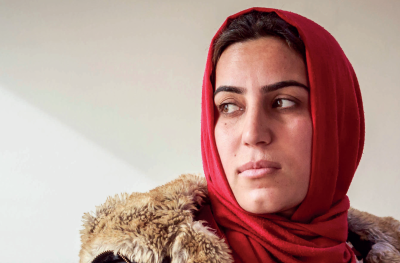We spoke with Aganze Eliud Murhabazi, from our dedicated team in the Democratic Republic of the Congo (DRC), about the impact he sees every day.
Since our last interview, a lot has changed in the world and our programs have had to be adapted to the COVID-19 pandemic. How have the women you work with been affected by the pandemic over the past year? What are the impacts you have witnessed?
There are two main events which happened because of COVID-19. First, we had the lockdown which lasted almost four months. When that lockdown started, we could not travel to the field to collect information or stories, so we could not do much since this was a government order.
When the lockdown was lifted, we needed to practice all of the safety measures which was tough for participants. Some of the participants were only able to join for four months of our program, which is designed to last twelve months.
There were also fewer income-generating activities during this time within our communities, which meant the program participants’ income decreased drastically. From the interviews we’ve conducted, we’ve also noticed that even those who were able to build some savings, these could not be sustained without two sources of household income. These women now need to depend on their husbands again and have less influence in the household.
“This greatly impacts decision-making, because the more economically strong women are, the more they can contribute to decision-making in the household.”
With more and more resources being diverted into COVID-19 emergency response, why is it important for donors and the international community to continue to invest in women’s empowerment and gender equality?
From what I’ve seen, when it comes to the pandemic and natural disasters, the focus is on saving people’s lives first but there also needs to be a long-term investment in development. Even if you invest more in the COVID-19 response, there are still underlying problems of inequality and lack of access to opportunities as well as gender-based violence. All these issues need to be addressed at the same time as responding to emergencies.
Last year, we had a major catastrophe in Uvira, where we have an office, and we could see people losing everything. If we can invest in their development, in addition to providing emergency care, we can give them hope to start a new life.
I’ve also noticed that, at the end of emergency periods, the items that are distributed end up being sold because this is not what is needed once the crisis is over.
“Instead, what you see from graduates of the Stronger Women, Stronger Nations program is a longer-term change.”
What message would you share with donors like players of the People’s Postcode Lottery who are funding the Change Agent program and your work in DRC?
From the way the program, supported by People’s Postcode Lottery, was implemented you can see great changes where women begin participating in community leadership and decision-making. Graduates hold a great role within their communities – some of them have even become role models.
For example, I have reported on some activities from the participants of our Change Agents program who were able to purchase land. They’ve now banded together and are now helping other women understand their rights when it comes to land ownership. If we could expand this approach to other communities, the impact would be even greater.
As part of our #PowerToChange campaign, we are asking our global community to pledge to use their own power to become change-makers. How are program participants using the lessons they learn to become activists? Can you share some specific examples?
Last year, we held a conference as part of 16 Days of Activism where we invited decision-makers from the local community, local government officials and Change Agents. The Change Agents presented their work and one participant talked about how they are leading the conversation around sexual violence. The Change Agents support other women to get help from government services to seek justice.
“The Change Agents say they feel most successful when they help other women learn about their rights.”
Change Agents are also now attending community meetings that they did not attend before. The most amazing thing about this is to see how these women started, one woman used to not be able to say anything in public and is now presenting on behalf of her group in the session with local authorities.
The Change Agents are actively leading the campaign asking local authorities to do something for them. You feel like they have been empowered. You could see them speaking loudly and asking government officials to bring to justice those who are guilty of committing gender-based violence.
They vowed that they will keep doing this until justice is served.
What does International Women's Day mean to you? What are your own #PowerToChange commitments?
I previously thought that International Women’s Day was about having celebrations and making speeches, but from what I’ve witnessed since this is a very powerful opportunity for women to speak up about issues they are facing. Our program participants face very difficult challenges, so this is the day to speak up to the world and say: “We have rights. We have the right to access land and family inheritance.”
"My own #PowerToChange commitment is to support women to have equal opportunities because they are the ones who drive our communities and our families. If women become powerful that means their communities will also become powerful.”
What are your hopes and plans for 2021? What changes do you hope to see?
The main challenge is continuing to address the impact of COVID-19 on our programs. My hope is to see more women graduate from our program, become more independent and become leaders in their communities. If we have five women becoming leaders, my hope is to have a hundred.
Women for Women International's work in the DRC is generously supported by players of People's Postcode Lottery.


